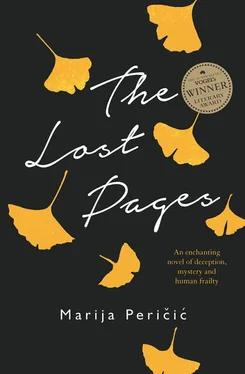At that moment the door ahead of me opened and two men dressed as orderlies came out into the corridor. I tensed, ready to bound away back down the corridor. I looked wildly about me and had the mad idea of opening one of the windows and jumping out of it and running away across the lawn, but I saw that the windows were overlaid with light grilles of metal. The men came silently on and my instincts told me that, as with facing an unknown dog, I should not show any fear. I stopped walking and raised my hand loosely in greeting.
‘Good morning, gentlemen,’ I said. ‘I wonder if you could direct me to the central administration area? There seems to be an error with my identity.’
They ignored my request and continued to walk towards me.
‘Or perhaps you could assist me in locating my clothing, or at least my pocketbook…’ My voice trailed off. The men still advanced as if I had not spoken. Had I in fact spoken aloud? Somehow I was not certain. They were both large men, broad and muscular, but at that moment this did not bother me as much as the fact that they were clothed and I was not. Their clothing transformed them into a different and far superior type of animal. The leather capsules of their shoes enclosed their feet and the hard soles tapped along the boards in a unified percussive beat, like hooves. Their clothing fit exactly around their limbs and torsos. I felt like an urchin with my flimsy gown flapping around my white legs and my feet spreading out their cold toes along the floor, sticking slightly to it with each step.
The men came one on each side of me, took me by the elbows and propelled me back down the corridor. As we dashed along, my questioning voice trailed away behind us like a fluttering ribbon. The faces of the men were as fixed and blank as the faces of the stone gargoyles that look out over the roofs of the city. When we arrived back in the room, the nurse who had accompanied Professor Pick earlier was waiting. The men pushed me towards the bed and stood side by side just inside the door, watching me.
Again I had the feeling of revulsion towards that bed. The bedclothes and mattress lay like a heap of rags and seemed to me to be diseased. My skin shrank from contact with the bed and the thought of climbing into it was now as repulsive being asked to enter the bed of a leper. I protested that the bed was not mine, and that the owner of the bed was a murderer; he had killed me in Berlin, or tried to kill me. I frowned. There was something wrong with the order of my thoughts, but I had no time to consider it. My words flew out of my mouth and circled the room, not finding the ears of anyone present. I repeated my name, shouting it, but it felt like I was swimming upriver in a strong current and making no headway.
The men began to advance towards me and I shuffled backwards until the edge of the mattress grazed the back of my naked knees. One of the men now stood in front of me with a tired expression on his flat face. He began to lean towards me, about to push me into the bed. I could see there was nothing that I could do, so I inched myself down onto the edge of the bed of my own accord rather than give in to the further humiliation of being pushed there by the silent man. I pulled the bedclothes over my legs, holding them with two fingers only, with my teeth clenched and my face screwed up in disgust.
The nurse came forward holding a small cup, which she offered to me. I struck it out of her hand, furious and afraid. The men came towards me and held me down, and the nurse, unperturbed, turned away and then turned back again with another, identical cup. I began thrashing around in the bed with all my strength, certain that the cup contained some poison. I thrust my head from left to right, until it was seized by one of the men. I clamped my lips shut, but they were forced open and the contents of the cup were poured into me. The men held me for a few moments more, until I ceased my struggle.
My body became soft and light and the perimeter of it seemed to become elastic and merge with the objects in the room. I lost my name for myself, even the name for the idea of myself, my ‘I’. It sounds alarming, but I felt nothing more than a great sense of relief. My existence in the hospital bed became unimportant and I forgot about the whereabouts of my clothing, my urgency to leave the hospital, the problem of the names. I came to live in the fog brought by the medicine. My thoughts floated around in my head like leaves blown by the wind. I watched them from a distance, sweeping past me in long arcs, and never bothered to try to catch hold of any one.
Scenes of my life before—writing, and going to work every day, and my family and Anja—were like sequences in a novel read long ago. They were suspended at a pleasant distance, only minimally interesting and amusing, and not at all important or particularly connected to me.
Words lost their definition and drifted away from the objects to which they were usually attached. Language became a kind of alchemy, an impossible marvel: to make a sound, an arrangement with one’s lips and tongue and breath, which would conjure up the image of a thing, a hard object, in the mind of another. It was like a magician’s trick. I would hear the words of others coming at me through the air, and perhaps I sometimes sent out words of my own, sounds, also. Words became meaningless; I lived in the surer world—to me it seemed surer—of the senses, of hot and cold, of colours, and feelings pleasant or not.
Now and then Professor Pick would appear, although I did not recognise him at the time, and dictate notes to an assistant. At other times he would arrive with a group of young people, who I realise now must have been medical students, and who examined and measured me and asked me condescending questions. They crowded around to discuss the notes in Pick’s little book. I watched the whole proceeding as if from a vantage point outside myself, detached from the action.
I floated in this state for some time—weeks, months—and then one day something changed. There was a sensation of movement and changing lights and I became aware of being transported out of the room to a different place. Here I experienced an all-encompassing coldness, and then the air surrounding me seemed to thicken and bring warmth and lightness. My arms began to float upwards and I could feel a hard surface below me. It took me a long time to identify myself as being in a bath. The word ‘bathtub’ came to me, four-square, pleasantly solid, standing on little hooks of feet, exactly like the object. It floated before my eyes, a flag waving in the air, but after a moment it disintegrated and became only another shape to be made with the lips, a string of coloured beads to play with. I felt the sides of the bath with my hands and gripped the curled lip of the rim, trying and trying to remember. I looked blankly down at my unfamiliar body as it lay there, pink and naked, in the porcelain shell.
In the following days and weeks I was subjected to an endless number of baths of varying temperature, duration and method. I had water dribbled over me gently, like rain; I was wrapped in wet towels, like a package of meat to be transported; I was sprayed with a hose like a horse and rubbed dry by one of the battalion of silent nurses who populated the hospital corridors. The baths must have elicited from me some kind of physiological response, because it was they alone that stood out from the swirling mass of days in the hospital.
In the bath I could remember the things that had been nagging at me. I would rise up out of the water, like a drowning swimmer, shouting, waving my arms, gasping for breath. Words came to me and I called for help, the word ‘help’ like the alarm cry of a bird dashed against the hard white tiles. I would call other words, my own name, that important word, again and again as though another self would appear and spirit me away from that place.
Читать дальше












